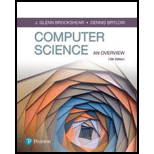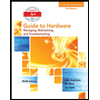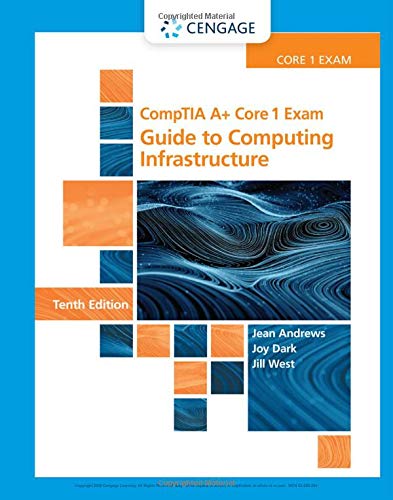
Computer Science: An Overview (13th Edition) (What's New in Computer Science)
13th Edition
ISBN: 9780134875460
Author: Glenn Brookshear, Dennis Brylow
Publisher: PEARSON
expand_more
expand_more
format_list_bulleted
Question
Chapter 2, Problem 36CRP
a.
Program Plan Intro
- Initialize the variable “bit_pattern1” as “00000000”.
- Initialize the variable “bit_pattern2” as “11110000” which is the mask value.
- Perform logical “OR” operation between the value of the variables “bit_pattern1” and “bit_pattern2” to display “1’s” in upper 4-bits, store the resultant value in the variable “result”.
- Print the result.
b.
Program Plan Intro
Program plan:
- Initialize the variable “bit_pattern1” as “00000000”.
- Initialize the variable “bit_pattern2” as “10000000” which is the mask value.
- Perform logical “XOR” operation between the value of the variables “bit_pattern1” and “bit_pattern2” to find complement of most significant bit in pattern, store the resultant value in the variable “result”.
- Print the result.
c.
Program Plan Intro
Program plan:
- Initialize the variable “bit_pattern1” as “00000000”.
- Initialize the variable “bit_pattern2” as “11111111” which is the mask value.
- Perform logical “XOR” operation between the value of the variables “bit_pattern1” and “bit_pattern2” to find complement of 8-bits pattern, store the resultant value in the variable “result”.
- Print the result.
d.
Program Plan Intro
Program plan:
- Initialize the variable “bit_pattern1” as “00000000”.
- Initialize the variable “bit_pattern2” as “01111111” which is the mask value.
- Perform logical “AND” operation between the value of the variables “bit_pattern1” and “bit_pattern2” to find “0” in least significant bit, store the resultant value in the variable “result”.
- Print the result.
e.
Program Plan Intro
Program plan:
- Initialize the variable “bit_pattern1” as “00000000”.
- Initialize the variable “bit_pattern2” as “01111111” which is the mask value.
- Perform logical “OR” operation between the value of the variables “bit_pattern1” and “bit_pattern2” to find “1” in all bits except the most significant bit, store the resultant value in the variable “result”.
- Print the result.
f.
Program Plan Intro
Program plan:
- Initialize the variable “bit_pattern1” as “111111111111111111111111”.
- Initialize the variable “bit_pattern2” as “111111111111111111111111” which is the mask value.
- Perform logical “XOR” operation between the value of the variables “bit_pattern1” and “bit_pattern2” to find change the color to black, store the resultant value in the variable “result1”.
- Initialize anremaining variable “bit_pattern3” as “111111110000000011111111” which is the mask value to filter all the green components.
- Perform logical “OR” operation between the value of the variables “result1” and “bit_pattern3” to filter out all green color components, store the resultant value in the variable “result2”.
- Print the result.
g.
Program Plan Intro
Program plan:
- Initialize the variable “bit_pattern1” as “111111111111111111111111”.
- Initialize the variable “bit_pattern2” as “111111111111111111111111” which is the mask value.
- Perform logical “XOR” operation between the value of the variables “bit_pattern1” and “bit_pattern2” to invert all bits, store the resultant value in the variable “result”.
- Print the result.
h.
Program Plan Intro
Program plan:
- Initialize the variable “bit_pattern1” as “111111111111111111111111”.
- Initialize the variable “bit_pattern2” as “000000000000000000000000” which is the mask value.
- Perform logical “XOR” operation between the value of the variables “bit_pattern1” and “bit_pattern2” to invert all bits, store the resultant value in the variable “result”.
- Print the result.
Expert Solution & Answer
Want to see the full answer?
Check out a sample textbook solution
Students have asked these similar questions
2:21 m
Ο
21%
AlmaNet
WE ARE
HIRING
Experienced Freshers
Salesforce
Platform
Developer
APPLY NOW
SEND YOUR CV:
Email: hr.almanet@gmail.com
Contact: +91 6264643660
Visit: www.almanet.in
Locations: India, USA, UK, Vietnam
(Remote & Hybrid Options Available)
Provide a detailed explanation of the architecture on the diagram
hello please explain the architecture in the diagram below. thanks you
Chapter 2 Solutions
Computer Science: An Overview (13th Edition) (What's New in Computer Science)
Ch. 2.1 - What sequence of events do you think would be...Ch. 2.1 - What information must the CPU supply to the main...Ch. 2.1 - Prob. 3QECh. 2.2 - Prob. 1QECh. 2.2 - In the text, JUMP instructions were expressed by...Ch. 2.2 - Is the instruction If 0 equals 0, then jump to...Ch. 2.2 - Write the example program in Figure 2.7 in actual...Ch. 2.2 - The following are instructions written in Vole...Ch. 2.2 - What is the difference between the instructions...Ch. 2.2 - Here are some instructions in English. Translate...
Ch. 2.3 - Prob. 1QECh. 2.3 - Suppose the Vole memory cells at addresses 0xB0 to...Ch. 2.3 - Suppose the Vole memory cells at addresses 0xA4 to...Ch. 2.3 - Suppose the Vole memory cells at addresses 0xF0 to...Ch. 2.4 - Prob. 1QECh. 2.4 - Prob. 2QECh. 2.4 - Prob. 3QECh. 2.4 - a. Suppose you XOR the first 2 bits of a string of...Ch. 2.4 - Prob. 5QECh. 2.4 - Prob. 6QECh. 2.4 - Prob. 7QECh. 2.4 - Prob. 8QECh. 2.4 - Prob. 9QECh. 2.4 - Prob. 10QECh. 2.4 - Using Vole machine language (Appendix C), write a...Ch. 2.4 - Prob. 12QECh. 2.5 - Prob. 1QECh. 2.5 - Prob. 2QECh. 2.5 - Prob. 3QECh. 2.6 - The hypotenuse example script truncates the sides...Ch. 2.6 - Prob. 2QECh. 2.6 - The Python built-in function str () will convert a...Ch. 2.6 - Use the Python built-in bin () to write a script...Ch. 2.6 - Prob. 6QECh. 2.7 - Referring back to Questions 3 of Section 2.3, if...Ch. 2.7 - Prob. 2QECh. 2.7 - Suppose there were two central processing units...Ch. 2 - a. In what way are general-purpose registers and...Ch. 2 - Answer the following questions in Vole machine...Ch. 2 - Prob. 3CRPCh. 2 - What is the value of the program counter in the...Ch. 2 - Prob. 5CRPCh. 2 - Prob. 6CRPCh. 2 - Prob. 7CRPCh. 2 - Suppose a machine language is designed with an...Ch. 2 - Translate the following instructions from English...Ch. 2 - Rewrite the program in Figure 2.7 assuming that...Ch. 2 - Classify each of the following Vole instructions...Ch. 2 - Prob. 12CRPCh. 2 - Prob. 13CRPCh. 2 - Suppose the memory cells at addresses 0x00 through...Ch. 2 - Suppose the memory cells at addresses 0x00 through...Ch. 2 - Suppose the memory cells at addresses 0x00 through...Ch. 2 - Suppose the memory cells at addresses 0x00 through...Ch. 2 - Prob. 18CRPCh. 2 - If the Vole executes an instruction every...Ch. 2 - Prob. 20CRPCh. 2 - Prob. 21CRPCh. 2 - Prob. 22CRPCh. 2 - Prob. 23CRPCh. 2 - Write a program in Vole to compute the sum of...Ch. 2 - Prob. 26CRPCh. 2 - Prob. 27CRPCh. 2 - Suppose the following program, written in Vole, is...Ch. 2 - Summarize the steps involved when the Vole...Ch. 2 - Summarize the steps involved when the Vole...Ch. 2 - Summarize the steps involved when the Vole...Ch. 2 - Suppose the registers 0x4 and 0x5 in the Vole...Ch. 2 - Prob. 33CRPCh. 2 - Prob. 34CRPCh. 2 - Prob. 35CRPCh. 2 - Prob. 36CRPCh. 2 - Prob. 37CRPCh. 2 - Prob. 38CRPCh. 2 - Prob. 39CRPCh. 2 - Prob. 40CRPCh. 2 - Prob. 41CRPCh. 2 - Prob. 42CRPCh. 2 - a. What single instruction in the Vole machine...Ch. 2 - Write a Vole program that reverses the contents of...Ch. 2 - Write a Vole program that subtracts the value...Ch. 2 - Prob. 46CRPCh. 2 - Suppose a person is typing forty words per minute...Ch. 2 - Prob. 48CRPCh. 2 - Suppose the Vole communicates with a printer using...Ch. 2 - Write a Vole program that places 0s in all the...Ch. 2 - Prob. 51CRPCh. 2 - Prob. 52CRPCh. 2 - Suppose you are given 32 processors, each capable...Ch. 2 - Prob. 54CRPCh. 2 - Prob. 55CRPCh. 2 - Describe how the average of a collection of...Ch. 2 - Write and test a Python script that reads in a...Ch. 2 - Write and test a Python script that reads in a...Ch. 2 - Prob. 59CRPCh. 2 - Suppose a computer manufacturer develops a new...Ch. 2 - Prob. 2SICh. 2 - Prob. 3SICh. 2 - Prob. 4SICh. 2 - Suppose a manufacturer produces a computer chip...Ch. 2 - Prob. 6SICh. 2 - Prob. 7SICh. 2 - Prob. 8SI
Knowledge Booster
Similar questions
- Complete the JavaScript function addPixels () to calculate the sum of pixelAmount and the given element's cssProperty value, and return the new "px" value. Ex: If helloElem's width is 150px, then calling addPixels (hello Elem, "width", 50) should return 150px + 50px = "200px". SHOW EXPECTED HTML JavaScript 1 function addPixels (element, cssProperty, pixelAmount) { 2 3 /* Your solution goes here *1 4 } 5 6 const helloElem = document.querySelector("# helloMessage"); 7 const newVal = addPixels (helloElem, "width", 50); 8 helloElem.style.setProperty("width", newVal); [arrow_forwardSolve in MATLABarrow_forwardHello please look at the attached picture. I need an detailed explanation of the architecturearrow_forward
- Information Security Risk and Vulnerability Assessment 1- Which TCP/IP protocol is used to convert the IP address to the Mac address? Explain 2-What popular switch feature allows you to create communication boundaries between systems connected to the switch3- what types of vulnerability directly related to the programmer of the software?4- Who ensures the entity implements appropriate security controls to protect an asset? Please do not use AI and add refrencearrow_forwardFind the voltage V0 across the 4K resistor using the mesh method or nodal analysis. Note: I have already simulated it and the value it should give is -1.714Varrow_forwardResolver por superposicionarrow_forward
- Describe three (3) Multiplexing techniques common for fiber optic linksarrow_forwardCould you help me to know features of the following concepts: - commercial CA - memory integrity - WMI filterarrow_forwardBriefly describe the issues involved in using ATM technology in Local Area Networksarrow_forward
- For this question you will perform two levels of quicksort on an array containing these numbers: 59 41 61 73 43 57 50 13 96 88 42 77 27 95 32 89 In the first blank, enter the array contents after the top level partition. In the second blank, enter the array contents after one more partition of the left-hand subarray resulting from the first partition. In the third blank, enter the array contents after one more partition of the right-hand subarray resulting from the first partition. Print the numbers with a single space between them. Use the algorithm we covered in class, in which the first element of the subarray is the partition value. Question 1 options: Blank # 1 Blank # 2 Blank # 3arrow_forward1. Transform the E-R diagram into a set of relations. Country_of Agent ID Agent H Holds Is_Reponsible_for Consignment Number $ Value May Contain Consignment Transports Container Destination Ф R Goes Off Container Number Size Vessel Voyage Registry Vessel ID Voyage_ID Tonnagearrow_forwardI want to solve 13.2 using matlab please helparrow_forward
arrow_back_ios
SEE MORE QUESTIONS
arrow_forward_ios
Recommended textbooks for you
 Systems ArchitectureComputer ScienceISBN:9781305080195Author:Stephen D. BurdPublisher:Cengage Learning
Systems ArchitectureComputer ScienceISBN:9781305080195Author:Stephen D. BurdPublisher:Cengage Learning C++ for Engineers and ScientistsComputer ScienceISBN:9781133187844Author:Bronson, Gary J.Publisher:Course Technology Ptr
C++ for Engineers and ScientistsComputer ScienceISBN:9781133187844Author:Bronson, Gary J.Publisher:Course Technology Ptr A+ Guide to Hardware (Standalone Book) (MindTap C...Computer ScienceISBN:9781305266452Author:Jean AndrewsPublisher:Cengage Learning
A+ Guide to Hardware (Standalone Book) (MindTap C...Computer ScienceISBN:9781305266452Author:Jean AndrewsPublisher:Cengage Learning A+ Guide To It Technical SupportComputer ScienceISBN:9780357108291Author:ANDREWS, Jean.Publisher:Cengage,
A+ Guide To It Technical SupportComputer ScienceISBN:9780357108291Author:ANDREWS, Jean.Publisher:Cengage, Comptia A+ Core 1 Exam: Guide To Computing Infras...Computer ScienceISBN:9780357108376Author:Jean Andrews, Joy Dark, Jill WestPublisher:Cengage Learning
Comptia A+ Core 1 Exam: Guide To Computing Infras...Computer ScienceISBN:9780357108376Author:Jean Andrews, Joy Dark, Jill WestPublisher:Cengage Learning EBK JAVA PROGRAMMINGComputer ScienceISBN:9781337671385Author:FARRELLPublisher:CENGAGE LEARNING - CONSIGNMENT
EBK JAVA PROGRAMMINGComputer ScienceISBN:9781337671385Author:FARRELLPublisher:CENGAGE LEARNING - CONSIGNMENT

Systems Architecture
Computer Science
ISBN:9781305080195
Author:Stephen D. Burd
Publisher:Cengage Learning

C++ for Engineers and Scientists
Computer Science
ISBN:9781133187844
Author:Bronson, Gary J.
Publisher:Course Technology Ptr

A+ Guide to Hardware (Standalone Book) (MindTap C...
Computer Science
ISBN:9781305266452
Author:Jean Andrews
Publisher:Cengage Learning

A+ Guide To It Technical Support
Computer Science
ISBN:9780357108291
Author:ANDREWS, Jean.
Publisher:Cengage,

Comptia A+ Core 1 Exam: Guide To Computing Infras...
Computer Science
ISBN:9780357108376
Author:Jean Andrews, Joy Dark, Jill West
Publisher:Cengage Learning

EBK JAVA PROGRAMMING
Computer Science
ISBN:9781337671385
Author:FARRELL
Publisher:CENGAGE LEARNING - CONSIGNMENT